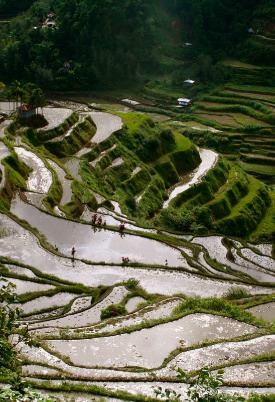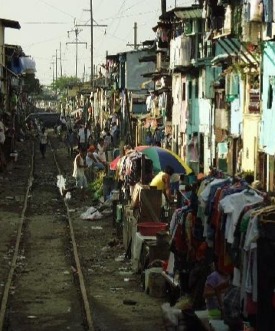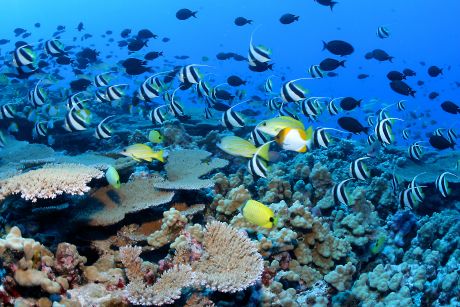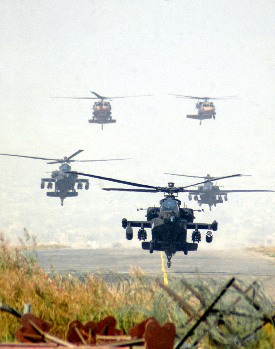The following is a list of the real opportunities that exist and which could be grasped by an administration with sufficient foresight and determination.
Agriculture.
• Fine wool production. The land above 700 meters in Luzon, Mindoro, Panay islands and Batanes can support about 10 million Merino sheep producing about 80 million kilos of wool annually with a value of some $640 million. The main markets for New Zealand and Australian wool are China, Korea and Taiwan. With lower labor costs and shorter freight distances a Philippine wool industry would be competitive and profitable. Deer farming could be incorporated into the sheep units. Jobs would be created in farm preparation and fencing and fencing materials, farm buildings, yards and woolsheds, shepherding, shearing, wool scour plants, tanning for end of life stock skins, mutton production and processing, downstream processing and spinning plants, fine garment factories using high quality fine wool cloth and suitings. The industry would produce some 2 million jobs including downstream and service sectors.
| SUPPORT INDEPENDENT SOCIAL COMMENTARY! Subscribe to our Substack community GRP Insider to receive by email our in-depth free weekly newsletter. Subscribe to our Substack newsletter, GRP Insider! Learn more |

• Fruit production. The highland areas can grow apples, apricots, peaches, plums, almonds and nectarines where the vegetables are now being grown. By planting trees at each end of the vegetable terraces a combination production is possible. Apples are currently growing in Malaysia. Kiwifruit can be grown in Northern Luzon in the citrus belt. This would be supplementary to existing farms and would generate extra revenues and follow on jobs. Tobacco growing would be replaced with kiwi fruit and olives and grapes.
• Trout fishery. The Cagayan river system in Luzon is ideal for the acclimatization of Brown Trout and would become a world class fly fishery for tourists. The tourist potential would be in the order of $10 million annually including licenses, guiding, travel and accommodation, benefiting the local rural communities.
• Radiata pine plantations. Much of the lower slope idle lands could be planted out to radiata pine yielding post and poles at 11 years and, by pruning, clear wood for veneer and furniture in 20 years. 1 million hectares would produce 500 million cubic meters at maturity valued at $1.5 billion. Some 100,000 jobs would be created.
• Seagull re-introduction. The lack of a seagull population causes many problems such as the golden snail infestations in rice lands and other pests. They could be progressively spread by bringing stock from Batanes. Savings from reduction in damage to rice and less chemical control would be significant.
Agriculture continued.

• Other Crops. Crops such as cassava and camote to be developed and promoted as additional staples and also processed into animal feeds to reduce imports of corn. All bio-fuel production to be stopped and the lands used to produce food crops.
• Palm oil production. Increased plantations of oil palms should replace crops for fuel as it can be used for food and also for the production of polyurethane resins for industry, more useful and effective than fuel usage.
Transportation.
• Jeepneys. Whilst it is not economically feasible to phase them out immediately the most urgent need is to replace the bodies with lightweight fiberglass or polyurethane shells configured to be comfortable. The current designs are overweight and consume far too much fuel just to move their mass. A large scale program to scrap the bodies and replace them should also encompass the scrapping of all un-roadworthy units. It should be mandatory for electric units to be used in all cities with a phase in period of 2 years. The displaced motorized units, after refitting with lightweight bodies, should be transferred to smaller centers. This program would cut diesel usage by up to 60%. Significant numbers of jobs would be created. The fuel savings would far outweigh the value of crops for fuel.
• Tricycles. To optimize this mode of transport it should be mandatory that each unit is capable of carrying a minimum of 5 passengers. New lightweight cars should be installed behind the driving position reducing the width of the unit. Cities to phase in electric tricycles within 3 years.

• Driver qualification. All drivers of public utility vehicles to be re-trained and licensed. A strict system of policing traffic offenders and removing their licences to be introduced and fully implemented. All public utility drivers to be paid wages and the boundary system outlawed. Stopping areas to be designated and policed. Offenders to be disqualified from driving and the vehicle seized and scrapped.
• The rail system. A system of railway lines should be established within each Region using locally made rails, concrete sleepers and third generation, non-polluting, steam locomotives (powered by local coal) and rolling stock. The complete system can be made locally including the locomotives and cars. The separate systems on the main islands would be connected by rail ferries. This program would create up to 1 million jobs. Issues of right of way would be handled by government decree taking the land without compensation. Courts would not be permitted to interfere in the process of national development.
• Inter-Island shipping. To ensure that the nation is served by a safe, modern and efficient shipping service the following actions are necessary.
1. Abolish MARINA. The survey and control of commercial vessels to be contracted to one of the international Bureaux of shipping e.g. Lloyds, Norsk, ABS, Veritas whichever will win the bid to provide the services.
2. Each Regional Administration will establish a Port Management Authority, accredited and audited by the selected Bureau. This Authority will be responsible for all aspects of ship control and safety on a voyage by voyage basis. In the event of any mishap which can be shown to be a lapse in enforcing load and safety regulations the erring officer will be deemed guilty of a crime and automatically imprisoned for 5 years hard labor and loss of all benefits.
3. Ship-owners scrapping their vessels for re-cycling into the rail construction project will be given concessional loans for new vessels if built in the Philippines.
4. The Philippine Coastguard will be upgraded and will have two major roles, Rescue and Fisheries Patrol.
Housing.
• The Philippines has a huge resource of low cost, heat rejecting and fire proof material to make house building a major industry, however that resource is simply burnt.

• As part of solving the poverty problem informal settlers in the major cities will be relocated to their home provinces in the regions and be put to work in the infrastructure development of the regions.
• Squatting will be re-criminalized and squatters removed and returned to their origins.
Energy and Utilities.
• Local oil and gas. The local supplies should be nationalized and all output consumed in the Philippines with maximum conversion of consumption to favor this. The price should be the cost of production plus the cost of maintenance and renewal. World energy prices are a function of speculators in western commodity markets and need not be imposed on the Philippines.

• Water and sewerage. Coastal communities can use wind and solar power to generate electricity to run desalination systems and reticulate the water. Community sewage systems can be constructed using biological processes to handle sewage and the final output applied as fertilizer to community market garden farms. These can be manufactured in the country. Water can be heated using solar collectors.
• River system re-habilitation. In the cities all creeks, esteros and canals appropriated by individuals and corporations to revert to the state and be restored. Development zoning to be established and polluting sources closed or rectified. A target of 95% of all waterways being free of pollution within 5 years as a responsibility of Regional Administrators.
Education.
• Distance learning. The school system to be changed radically taking advantage of the existing cellular telephone networks. By expanding the bandwidth, providing wi-fi to every school (this to be done by the telecommunications companies who would be paid by a reduction in taxes on their commercial transactions) and providing each school child with a computer, lessons would be by distance learning with the class teacher as convener and moderator. This would allow the central teaching establishment to access lesson plans and packages from throughout the world so that core subjects would have extremely high standards. Local subjects could be developed at the central facility using the best academics. This system would be relatively inexpensive, high performance and most significantly allow all children to access the best quality information, ethics training and citizenship awareness. No religion to be taught in schools.
• Adult literacy. Each unemployed person working for the unemployment pay will undergo a literacy and skills test. Those with deficiencies will be required to spend an additional 2 hours per work day in special literacy and skills training.
Health, income and sport.
• Health. Primary health care to be provided free by Regional Administrations. The production and sale of all tobacco products to be progressively taxed to fund this care. Pharmaceuticals will be sourced at least cost and provided by the Regional Administrations free to the unemployed and at a flat rate to others. Public hospitals to be upgraded to acceptable international standards. Contraception and reproductive education and products to be free.

• Income. The basic minimum wage to be P 1,000.00 per day with the attendant requirement that employers facilitate and demand increased productivity: unemployed persons will be put to work on infrastructure, environmental damage repair and waste management tasks and paid P500 per day. All government employees, Regional and National to be paid on a scale that is 3 x the current scales with the concomitant provision that corruption and laziness will result in summary dismissal.
• Sport. Football (Soccer) to be the national sport and taught in all schools; The AFP plays football and could be tapped for first level coaching followed by accreditation into a national League. Communities to be encouraged to make pitches available. Subsequently as the pool of players increases commercial clubs would be formed.
Marine Biosystems.
• Within each region Administrators will enforce the laws on fisheries and the environment ensuring that each municipality secures a minimum 15% of its municipal waters in Marine Reserves as mandated by the RA 8050. Each and every municipality will be directed to ensure that its officers down to the barangay level effectively implement all laws pertaining to pollution, destructive fishing, farming and other extractive processes.
• Philippine Municipal waters.
Municipal waters are defined as extending from the low tide mark out for 15 kilometers (RA 8550).
The Philippine coastline is 36,289 kilometers (CIA World Facts). Therefore the potential area of the Philippine Municipal waters is (36,289 x 15) 544,335 square kilometers. A reserve area of minimum 15% (RA8550) yields 81,650 square kilometers, or 8,165,000 hectares.
If 5% of these reserves are restored to viable coral reefs they will have a value of at least $132,000 per year (Cambridge, England-based project
called The Economics of Ecosystems and Biodiversity (TEEB)) per hectare. That is the total annual yield would be 34 billion dollars. This can be achieved very easily with Philippine designed and produced Eco-Coral artificial reef substrates which will allow the reefs to re-grow and be fully active after 5 years. Displaced fishers who are not absorbed into Bantay Dagat will be organized in to aquaculture and mariculture co-operatives supported by the Regional Departments of Agriculture.

• The export of live fish of any kind to be banned.
• Regional Administrators will be required to establish a Marine protection force to protect fisheries from local and foreign thieves. All those caught to receive mandatory 5 year hard labor sentences with loss of all assets used in the commission of the crimes – vessels to be scrapped and recycled for the national rail construction program..
• Payment for the establishment of the Marine Reserves and the Bantay Dagat patrols will be funded by a “Resource Depletion Levy” of 40% applied to all Marine exports based on average invoice values for the years 2010-2012 and updated annually. The 2007 exports were Php 23.287 billion (BFAR External trade) thus the funding for reserves will be an annual amount of Php 9.315 billion to be collected within each Regional Administration. If this levy meets buyer resistance that will be in the interests of the nation as the fisheries will recover faster. Each export fishing operator will have to obtain a “Resource Depletion Permit” which will be pegged at the catch levels of the year 2,000 and will include all by-catch and discarded catch.
Tourism.
• The main thrust of tourism expansion will be based on the Marine environment, Regional culture and cuisine. First target to exceed Thailand as a destination. To achieve this the following steps.
• Regional clean up of the environment (see above Barangay Officials responsibility).
• Establishment of honest, reliable law enforcement to ensure the safety and wellbeing of visitors.
• Enhanced standards of hygiene and service in all establishments catering to the hospitality industry.
• Adhering to a strictly “Green” code of construction and operation.
• Concessional government loans for certified “Green” projects and developments.
• In addition Wilderness Walks could be established in various regions such as The Sierra Madre from Peneblanca to Baguio Point on the Pacific Coast – these walks attract tourists from all over the world and heighten the awareness of the need to protect the environment.
Trade and Industry.
• The population is approaching 100 million of whom 80% are not really partaking in the general economy existing, rather, in a subset economy of privation from all the necessities of life including education.

• China like Philippines has a majority of its population in the deprived sector and realizes that the best policy is to enable these people to participate in the consumer economy which can only be done by raising their income levels.
• The Philippines must follow a similar strategy that raises the incomes of the deprived, rather than relying on OFW subsidies to government failures. Taxation has to be legitimized; the current system of regional collectors and assessors negotiating with taxpayers and pocketing half the amount must be stopped immediately, as with the collection of duties. Personal taxation on the upper quartile should be based on outward signs of wealth not facile mechanisms to hide wealth, the rates should be progressive.
• By raising wages and implementing the programs in this manifesto there will be stimulus for the creation of enterprises in the Regions and for large manufacturers to de-centralize production to the regions to reduce transportation costs.
• Goals should be based on increasing domestic consumption as opposed to export. Foreign currency is only needed to pay for imports; the generation of internal money is a function of central government not the IMF or World Bank. In fact government can issue as much as is needed for internal transactions. This then determines that, now the Global economic bubble has burst and is going into depression, the old common sense of Do It Yourself is necessary e.g. manufacture what is needed in country even if this means adopting particular strategies and technologies to utilize local resources. The money to pay for these can be issued internally and paid to consumers as wages. The folly of the traditional strategy of minimizing wages is that it also minimizes markets.
Finance and Budget.
• The 2008 full year budget was set at Php 1.066 trillion plus Internal Revenue Allotment of Php 210.7 billion and debt amortization of Php 328.4 billion.
• With a standard corruption loss of 30% an amount of Php 319 billion is stolen.
• Savings from this manifesto are :
– Theft reduction – 300 billion
– Abolition of congress – 6 billion
– Department of agrarian reform (totally irrelevant operation) – 2.3 billion
– Commission on Elections (devolved to regions) – 3.2 billion
– Budgetary support to Government corporations – 12.5 billion
– Agriculture and fisheries modernization program (devolved to Regional Administrations) – 23.3 billion
– Allocations to local government units – 21 billion
– Debt service (write it off) – 269 billion
– Un programmed fund – 114.4 billion
– Total savings – 751.7 billion or 70% of the total 2008 budget mis-allocated.
• The savings allow the implementation of this manifesto and will be supplemented by an increase in revenue collection by imposing honesty on the revenue agencies.
• Line departments including Agriculture and DENR would devolve operations to the Regions and the central offices would function as managers of overall national policy in such areas as food security and environmental re-habilitation.
Regional Government.
• There are too many layers of local government, too many provinces at too large a cost.

• Mechanized/manual voting to be implemented with Regional Administrations funding and appointing an independent Electoral Commissioner to oversee the electoral process. The candidate’s presentations to the people will be on publicly owned media only, equal time in joint sessions and debates defending their respective platforms and economic and social program proposals. No images, posters or other populist material permitted.
• All signs accrediting public works to mayors, councilors et al. to be prohibited and removed. All public works will be audited by independent engineering consultants, retained by the Regional Administrators, working with independent auditing consultants. Acts of corruption to be tried summarily by the anti-corruption courts with no opportunity to delay proceedings; those found guilty to be jailed for 20 years hard labor and all their assets forfeit. The practice of special accommodation for the likes of Jalosjos to be abolished.
• Regional Administrations would be responsible for basic infrastructure and utilities (within the context of the points above), policing (free from local government interference and civil in nature and title.), health and welfare (not education except the provision of school facilities and moderators), employment and unemployment benefits, the environmental laws, land titling and land use planning and resource management within the framework of national laws, vehicle and driver registration. They would levy a local VAT, replacing the national VAT, the percentage not to exceed 15% which they would collect. Past provincial governors, provincial councilors, city and municipal mayors, councilors, barangay chairmen and relatives would be ineligible to serve as Regional Administrators or regional councilors if they belong to a family political dynasty. Cities and Municipalities within a region are under the overall jurisdiction of the Regional Administration which will provide their revenue allotment on a per capita basis. All such cities and Municipalities would elect new officials with the previous caveat that no previous dynastic office holders or relatives would be permitted to run nor to be involved in any way whatsoever in the election process. Vote buying, intimidation or manipulation would be subject to summary conviction (one day trial), imprisonment for five years and the imposition of a fine of 50% of the offenders assets as determined by an assessment of the outward signs of wealth of the offender. In electoral fraud cases no appeal would be permitted.
• Central Government would administer and or support national security and the armed forces, education, international relations, treaties and transactions, corporate and income taxation, central banking and banking oversight, SEC and the Supreme Court, the NBI, overall resource and environmental management, transportation safety standards and related matters, customs and border control.
• There would be no House of Representatives. The Regional Administrators would each appoint 3 representatives to the National Council which would be the body to develop national legislation in consultation with the President and the National Executive department. The Regional Administrators, acting as a Collegial Commission would select (and remove), from their own members, the President who must be no younger than 35 years nor older than 55 years.
• Religious organizations will not be permitted to organize against nor oppose the lawful acts and policies of the Regional Administrations nor would it be lawful for them to take any action to influence voting for the Regional Administrations; additionally such organizations will be required to pay the same taxes and duties as all other citizens.
• Appeal Courts will be set up in each Regional Administration with the final court being the National Supreme Court, the National Court of Appeals to be abolished.
Insurgency and terrorism.
• The implementation of the above policies would largely remove the raison d’etre of the NPA and they would fade away. The situation with the MILF is not so easy to manage as it is similar to the Northern Ireland situation where there is a band of armed men who know no other life and do not wish to relinquish their only reason for self esteem – their weapons. If the new Regional Administration of the ARRM were to succeed in raising the status and wellbeing of its citizens this would tend to diminish the activities of the MILF. 11,000 armed killers do not represent the 19% of Mindanao’s population therefore they cannot be negotiated with on the fate of that 19%, they can only be negotiated with in an effort to persuade them to disarm and go to work. It is the height of absurdity to consider giving them control of a region and a population when their only qualification is experience in murder.
• Within the ARRM the Regional Administration would be required to deal with its Islamic terrorists and could seek help from Central Government. However acts of violence directed against other regions would be seen as criminal not political and would be treated as such.
• As a component of addressing terrorism the Police and military to be required to disarm all civilians without exception.
Military.
• It is clear that from the time of the closure of the US bases the AFP has degenerated in terms of hardware and training. The US has used the AFP as a means of training their own personnel and of following a separate agenda to secure Mindanao as a counter base to the Chinese being out of range of short range missiles which currently predominate in China’s arsenal. Association with the US is counterproductive and prevents the modernization of the AFP. Clearly the US does not place any strategic value on the AFP or it would have armed and trained them to the same level as they have done with the Taiwanese or Koreans.

• The US has shown quite clearly that it treats most of the rest of the world with disdain using con schemes to damage economies, pre-emptive attacks on whomever it chooses and interference in almost all governments of the world.
• It is time for The Philippines to accept that it’s nearest significant neighbor is China and that its future is irrevocably linked to China whose economy will overtake that of the US in the medium term.
• The US troops to be removed from the Philippines and a new alliance negotiated with China wherein China will provide long term finance to modernize the AFP with Chinese hardware. This alliance will ensure fair division of the resources of the region without provocative acts and conflicts.
• To strengthen the AFP and to uplift the potential of the young a new regime of conscription to be introduced whereby all able bodied persons between age 18 years and age 25 years will serve 3 years in the AFP, 1 year in training and education, 1 year in the field and 1 year in skills training and work in various community endeavors such as irrigation, medical teams, environmental cleanup, environmental protection. Those persons who have completed college education and are in full time stable employment will be able to avail of a waiver but remain liable to conscription until their 30th birthday.
Conclusion.
• After some 5 years implementing the above policies the Philippine Nation would be much stronger and happier. Most OFWs would return to take up the jobs created by the policies and in general poverty would be largely alleviated by using the same resources more effectively.
• The corollary of poverty is wealth and these policies would see to it that wealth was derived from contribution and effort rather than position, influence and theft.
• Compulsory military training will do much to improve the lives and attitudes of the indolent, unemployed young persons whilst reducing crime and general violence.
• A fully upgraded AFP with an effective modern air force, blue water navy and well armed and trained soldiery will restore national confidence.
• By joining the region where the country is situated and by making an alliance with China the Philippines will assure itself of a proper place in the new world which is fast approaching. Within 2 or 3 years China will be as close as Kaoshiung in Taiwan and the Philippines will be protected from being used as a staging ground for US interventions which will assuredly bring death raining down on the population.
• The economic provisions of this manifesto will provide the country with the necessary stimulus to employ its own people and give them a decent living. Most of the programs will be funded by the great administrative savings and increased cost effectiveness of regional and central administration.
• The administrative proposals will ensure that the resources of the country are managed by qualified professionals whilst neutralizing the elements that have continuously failed and deprived the bulk of the population.
- Best opportunity for the Philippines – A Manifesto for development - February 6, 2014
Nice dream – except regarding the chinese. The Chinese want to own us, just like the Americans. Replacing one master with another when it took us so long to shake off the Yanks – No thanks.
I’m sure we could all make wonderful plans for thr PI if we had a magic bottomless treasury that never ran out of funding. But unfortunately that’s not going to happen.
Good to see a foreigner dream for the betterment of our country though. Well done.
Well, this is achievable now. What the country needs are leaders with such visions, filipinos who wants change and not just the “grin and bear” pinoys.
Americans do not want to own you. You had your chance at statehood 50 years ago. Now it is too late. The last 30 years of criminal mismanagement have turned Paradise into Smokey Mountain. What sane country would want to take on the mess that
this country has become?
In any case, trying to shrug off the rest of Asia while trying too hard to appeal to America is only going to further screw up the PI. I’m personally not too keen with the China proposal that the author wrote, but perhaps a level of cooperation similar to Taiwan and Vietnam would be the best approach. In addition, the Philippines doesn’t need to cut off all ties with the US either, but should reach agreements towards issues that concern the two nations especially in regards to overseas workers.
A theory, until tested, remains a theory……unproven and unpredictable
As far as I see it, this is not a theory but useful ideas which should be given a worthwhile thought. Your defeatist attitude is one of the reasons the Phils. cannot move on and make radical changes and the main reason why we are still in deep s__t.
It’s better to have a sound theory/suggestions than having none at all, which as you have already realized by now is that you failed to provide a sound one.
Somebody makes some positive and constructive suggestions, they get ignored and derided. Somebody makes makes some harsh criticisms and people get all defensive and up in arms about it.
How do we expect this country to prosper when it’s full of these kinds of people like MKULTRA.
The suggestions for development are all very inspiring and plausible. Too bad, the more I read it, the more frustrated I feel due to the looming sense of idiocy, shallowness and stubbornness prevalent in this country.
Then test it through experimentation. Isn’t it that many of the scientific fact we have started as theories?
Nice article. I’m sure many will benefit from this analysis and hopefully it will create more opportunities for local and foreign markets.
The agriculture part is very interesting. Our agriculture sector needs to diversify in order to maximize our potentials for greater production.
Very impressive, and interesting
Aside from your specific advocacies/proposed solutions, i would be interested in whether the current administration has a clear agenda for change, long-range plans in the key areas/sectors, a mechanism for gathering input – ( and providing feedback), quantifiable objectives, and the expert skills necessary to identify and implement such projects.
I.e. is real progress being made or simply talk/seminars/studies and paper shuffling.
Good, thoughtful analysis….How do you propose wresting power from the oligarchs, the military and the Church; who are more interested in feathering their own nests, than doing what’s right for the country.
For once, a truly positive article regarding the Philippines which proposes realistic solutions for its improvement. I don’t have much hope for the current leadership, and so this must be disseminated to the ordinary Filipinos especially the fresh graduates and younger. Who knows, the next generation of leaders of the Philippines who are fed up with what’s happening here might have read this and similar articles and put it into good use?
I have seen a bale house in wales which was an impressive one-off house, but for low cost mid volume housing – with flexible uses ( disaster, schools, student accomodation et), i believe recycled shipping containers offer a practical and rapid solution.
Tempohousing has a great project in keetwonen, netherlands, and even brighton in uk use adapted containers for housing homeless people.
The solutions are there ( tata india) are designing mass housing solutions for low cost housing.
Guess philippine property developers are only interested in high profit generating rabbit hutches not eco-architecture or even architecture seeing some of the monstrosities which they construct
Nice article…Mate…that’s telling them. Too much corruption is the primary problem of our country. From up the level of government to down the Barangay level. Police corruption is the next. The third is peace and order. There is a NPA Mafia in the countryside, extorting people of revolutionary taxes. The NPA insurgency is supported by the Aquinos/Cojuangcos to hold on their Hacienda Luisita; and to have political power. Insurgency of all kinds are in our country. Warlords are in the provinces, ruling as family dynasties…
We have to deal also with: Feudalism; Feudal Oligarchy; the failed system of our government…
We have a sham Democracy.
The attitude of these “bloody” people called Filipinos must change. To Change this “bloody” country, into a better one…
Anyway, thanks for the article…it is a thought provoking one. To give these people a view of what they can do…
I’ll skip the Cultural and Economic parts to say this about the Military:
– America trains and arms the Taiwanese and South Koreans because those countries can afford to pay for those opportunities based on their economic output, not because of some skewed American Favoritism. If the R.P. could afford to buy or build its own American hardware under American License, the US Dept. of State would be tripping over itself in handling Foreign Military Sales to the Philippines for state of the art hardware. The Philippines asks Americans to train here, not the other way around. Remember Balikatan from the very first year was under invitation from the AFP, not coercion from the US DoD. “Mindanao Counter Base out of Chinese SRBM range” lol. Guam is more than adequate to launch a counter-attack in case Japan, South Korea, or Taiwan falls.
– ASEAN is a small-region. Asia is bigger than SEA. “Alienate” from ASEAN at the price of Allegiance with bigger economies and powers such as Japan and South Korea is not a bad deal.
– What, “pre-emptive attacks on whomever it chooses and interference in almost all governments of the world”? I didn’t realize TWO countries would represent “almost all governments of the world”. Afghanistan was a Counter-Attack. Iraq was a Re-Attack for Violating Sanctions that was a long time coming. Go keep fooling yourself with that “pre-emptive” nonsense.
– Chinese Hardware copied from Russian Hardware would be run with Chinese Software, and such is rife with Chinese Spyware. Why would you want to buy that? “Fair Division by Alliance” yeah right.
– A three-year conscription is useless for cultivating all but the most very basic skills in everything you mentioned. Not being prior-military you wouldn’t know that a solid “NCO Corps” is the backbone of any military. Who would supervise and lead your three-year draftees-who-don’t-want-to-serve? The US military is the best in the world not because of its hardware, but because of the people running those hardware. I’m qualified in at least three of the four “community endeavors” you mentioned. Guess what, those skills weren’t honed in three short years. Your “one year in training and education” is also about six months too long if you exclude that other time for “skills training and work in various community endeavors”. Only linguists, special operations forces, and the like take “a whole year” just for “training before going to the field”. What sort of course of instruction did you have in mind?
Thanks for saying all the things I wanted to say, especially the one about allying with China.
I appreciate his effort in trying to make solutions but maybe some tweaking is needed in regards to all the “great leap forward” type ideas. I do like the labor camps idea though. lol
Energy and Utilities:
– Oil and Gas: Yes, let’s Nationalize the Utilites and watch the Corruption Percentage rise above 30%. Didn’t NAWASA go bust that way?
– Electricity: Again with the Nationalization idea. Didn’t that idea already fail, only to be replaced with an EPIRA law that ia also proving to be another failure?
– Water and Sewerage: I don’t think you fully-realize the electrical demands of running desalination systems. If it were that easy, Southern California wouldn’t need to get its freshwater from Northern California along with the Colorado River. SoCal would just be sucking in seawater from the Pacific Coast.
– River System: If you’d apply a real Clean Water Act like they do with the US with their CWA and NPDES, you wouldn’t need to revert “surface waters” to the state. The sanctions for violations of those are enough to dissuade polluters. Without present pollution discharges, the rehabilitation process will mostly happen by itself. But since you’re repealing present laws with your government land grabs, I suppose making new tougher laws would be a piece of cake, right?
Housing:
– Isn’t heat-rejecting and fire-proof equal synthetic? What resource is that which you say is “simply burnt”? Coco lumber?
– Storm-resistant houses made of straw? That’s not how I remember the Story about the Three Little Piggies went. If a big, bad, wolf can blow one down, I doubt a storm will have a difficult time.
– I’m trying to find the Funding Source for your Relocation Proposal. Somehow I can’t find it, and the problem is not with my prescription eyewear. Could you elaborate?
– You don’t remove and relocate criminals to their points of origin. You send them to jail. Otherwise why bother making squatting a criminal offense?
Transportation:
– Jeepneys: Lightweight fibreglass and polyurethane shells are not exactly crash-worthy. Great for watercraft, lousy for public transports unless you’re talking about 4×4 Gators and Golf Carts. Who pays for the impound and scapping fees? Unlike America, we don’t have those modern junkyards with high-powered crushers to gain the scap metal. That’s why cars are run-to-death in the R.P. Electric Motors require copper wiring and lots of it. I can’t even get decent copper tubing to use as plumbing, and all the supplies for copper wiring already used in construction isn’t exactly abundant as it is. Isn’t that why copper wiring is pilfered to such a ridiculous degree that a wholly-separate law was needed to address that sort of theft?
– Tricycles: Mate a five-passenger trike isn’t a trike anymore. That’s a small car, unless you want to throw all passenger safety regulations out the window. Same problems securing components for electric motors as above.
– Buses: I’m for the Honk Kong model, but frankly, the Los Angeles model is better. Philippine Buses are too damned big. They’d be considered Tour Buses if they plied U.S. roads. How do you get rid of all the old and not-so-old behemoths first?
– Drivers: You need to fire all the drivers first before you can re-hire and re-train them. True Public Utility Drivers are employed by private companies under contract with a public government organization. Where are those companies now, and I’m not talking about all those “franchisees” under contract by the LTFRB.
– Rail System: So basically, you need to repeal RA 8974 to implement your “government decree taking land without compensation” idea? Damn, and it was just passed in 2000.
– Inter-Island Shipping: The Phil. Coast Guard should be under the AFP like the USCG is under the US DHS and DoD. Giving it a Rescue and Fisheries Patrol Mandate runs counter to its mission under the DOTC. Essentially they’re waterway cops, not part of the Border Patrol or Customs Bureau.
Okay mate, from one “foreigner” (read: been gone awhile Balikbayan) to another, lemme poke a few holes in your arguments.
Agriculture:
– Wool: Where do you get the grain feed for all those Merino Wool-Producing Sheep? The Land is overtaxed for human food consumption as it is, now you add more livestock. You neglected to propose how the biological and chemical waste from such endeavor will be handled. Run-off from soil contamination into surface waters increases especially at the altitude you propose. The Philippine Clean Water Act is weakly-enforced as it is. Where does all the crap go? What sort of electricity rates would be shouldered by the sheep “facilities”?
– Beef: Sneaky example using cattle from Northern Australia. Aren’t you neglecting to cite the differences in climate and topography between Nor. Oz. and “idle lands in the Philippine Archipelago” (a title which I dispute BTW)? Australia does get cyclones, but do they compare favorably to typhoons in the R.P.? Come the next supertyphoon, most of your cattle farmland will get wiped-out, along with your cattle. Such livestock shares the same logistical needs as your sheep, so the same questions about grain feed and waste management apply. Did you consider those?
– Fruits: Where do you get the fertilizer and insecticides to raise and protect those crops? Even in mostly-flat North America where those fruits are grown, mechanized applications are required, including airborne crop-dusting for insecticides. The tropics are rife with pests. Where would you situate the airfields for the crop-dusters? The archipelago’s topography makes such flying risky to say the least, and we seem to have a shortage of Luke Skywalker types to dust the highland fields. Oh yeah, AvGas, how much is it in the R.P.?
– Trout: Nice, I like trout. Isn’t salmon a type of trout? Don’t trout need to swim upstream to spawn? That is, if they actually get to full maturity downstream, where all the people and pollution are. You forgot the weakly-enforced Clean Water Act again. If you like heavy-metal toxics-laden fish for dinner, go right ahead. I’ll pass.
– Pine Trees: Wait, didn’t you already want to convert the highlands into cattle and sheep farms? Where do you raise the trees? Hell, I can’t even find decent Pine Wood Furniture now, along with good-but-cheap beef. I hate the local “Marine Plywood” creations, I want the yellow stuff we use for cabinets in the States. While the beef we can import now, the pine wood stuff seems to be frightfully over-priced via the same import mechanisms. So if we raise our own beef, doesn’t that knock-out the pine trees too?
– Seagulls: Again, weak Clean Water Act. Re-introduce seagulls now and you’ll have dead hatchlings in less than a generation. Toxins in the food chain causes weak eggshells, among other problems. Isn’t that how the American Bald Eagle became Endangered?
– Rice: Oh wow, rice cultivation does not lend itself well to mechanized farming, doesn it not? Small gas-powered tillers really shouldn’t qualify as “mechanized”, the land areas covered are too small. I’m talking about large combines and such used in harvesting wheat grains in Australia and the US Midwest. Now that’s “mechanized”, but still completely inapplicable for a crop raised in paddies and not fields.
– Other crops: Okay, since we really can’t mechanize rice production anyway, let’s just switch the entire population to dry grains (e.g. wheat and barley) along with root crops that won’t need paddies. That’s how you apply mechanized farming. Good Luck changing the Filipino Mind-Set of “without rice, it is not a meal”. Me, I’ll do fine. Already lived without it in the States. I’d like me some Idaho Potatoes and I miss my Red Potatoes to go with the Pot Roast.
– Palm Oil: Okay, so somewhere between all the cattle and sheep farmland, and the pine tree and grain and root crop plantations, we’ll still have space for Palm Trees? Don’t we need space somewhere for the Petrochemical Facilities to produce and process the chemicals needed to cultivate the All of the Above? In America they inject Anhydrous Ammonia into the soil to raise their corn, do or how will we have the infrastructure to do the same with our farmlands?
Interesting article by @Hugh Stanley. I think it is an attempt to introduce and localize a British concept like the abolition of the Philippine Congress and the Court of Appeals and devolve them to regional administrators to prevent political dynasties? The raising of sheep’s to produce wool? Sheep’s grow its fur during the winter time so how would you produce quality wool fabric in a tropical country like the Philippines. These three proposals are just a few that I think would raise the question if any of the items @Hugh Stanley have presented are feasible.
I think the answer to most of @Hugh Stanley’s proposals are basic sound implementation, not overall restructuring of the system. @RyanF1 has presented a good rebuttal and I would be interested to see how @Hugh Stanley would respond.
Great idea’s and GOOD LUCK getting the criminals who run the country to implement even ONE of the idea’s.
The Fail-ippines,as it stands right now, is a failed state. The Kleptocrats that run this failed state are profiting from the failed state mightily. So, that said , why would anyone who is part of the kleptocracy want to improve the country? Oh, They don’t? thieves do not hire cops.
I will take note of these ideas. They are very practical. The executive part of the government should read this.
I was fascinated with the new agriculture ideas of the author.
For the China being our military ally, it will be hard at first because our forces are trained with NATO weaponry and if we adopt the Chinese alliance, all of our forces should undergo retraining on the operation of this new military hardware. It would take years before the whole AFP become adept with Soviet Bloc weaponry.
On the rail transportation, this rail system should not just be rehabilitated. It should be redone, there are some PNR stations which are not capable of having a longer train and contributes to the traffic congestion. One example is the pnr buendia station, as you can see this station is situated between two roads thus limiting the length of this station which also limits the length of the train it can serve. This station should be moved further so it can be expanded. Also this rail contributes to the congestion of buendia ave because everytime a train passes it will skip one “turn” of a green light thus creating a bottleneck. I am thinking that the dpwh should consider making this intersection an underpass so that vehicles who pass buendia will never stop when a pnr train passes.
With one or two provisos (eg., oil palm is fine if it’s grown as an intercrop rather than as huge plantations replacing cleared forest) that’s an excellent list. I’ve come to much the same conclusions myself. The author’s bio made me smile: I have an almost identical career track. Is there something about engineers that makes them think this way?
Unfortunately – having read all I can about the law and business environment in the Philippines – none of this will happen anytime soon under government direction. The people running the show have essentially no understanding either of basic economics, or of the issues Mr Stanley is writing about.
Even more depressingly, foreigners who would like to implement these ideas as commercial ventures are either explicitly excluded, or are forced to follow pointless constraints seemingly designed to ensure failure.
While I’m hoping to continue with my plans – involving organic agriculture and some sustainable electronics tech – I can only do so my limiting my involvement with the law (without, of course, breaking it). The powers-that-be simply do not want any kind of development to occur, and that’s all there is to it.
@RyanF1: no need for the snottiness: you apparently don’t have much experience with tropical agriculture. Some of your points are valid (attempting to mechanize rice production is both pointless and difficult) but most are not.
1) Sheep are free-range animals. As long as you’re raising them on undamaged natural vegetation, there is no “runoff”; excrement is recycled naturally by other organisms (plants and animals) on the land.
2) Cattle do not eat grains. They are ruminants. Eating grain makes them ill or kills them. This is one of the reasons animals arrive in such awful condition at the slaughterhouse – they’re pretty much on their last legs anyway. Mr Stanley specifically wrote about free-range on highlands (where the climate is temperate). I’m not entirely convinced this would actually work, but it sounds plausible.
Fruits: fruit trees normally do not need either insecticides or fertilizers when grown in a natural manner. They only attract pests when grown in huge monocultures, and pesticide spraying exacerbates any problems by destroying the natural prey-predator relationships.
Wood etc: these can easily form part of the general structure of the plantation. In the tropics you MUST have complete soil cover, which typically means a multilayered design: shrubs, tall trees, and smaller perennials packed together. Palm oil, fruit, hardwoods, and perennial vegetables can be quite easily grown together. I have such a mixture growing very successfully.
The seagulls thing is a bit off-the-wall: in my experience, a large number of endemic species will quickly move into a well-designed, chemical-free agroforestry project and take over whatever role Mr Stanley had in mind for the seagulls!
I might not “have much experience with tropical agriculture”, but I do know enough about biology and environmental assessments that there isn’t enough of the right type of vegetation to support a sizable sheep and cattle population. There’s too much of the rubbish vegetation we call “cogon grass” and not enough of the broad-leaved grass, clovers and forbs common to western pastures. Heck, while I can see there are a lot of “idle lands” about, I wouldn’t classify them as “pastures” due to the deplorable lack of plant diversity that’s taken root. That’s why sheep are so rare compared to goats. Goats will eat anything.
Oh yes, there will be runoff. So much of the topography isn’t of the good soil you’d associate with productive farmland, especially in the “highlands”. There’s plenty of that rubbish clay masquerading as top soil. With the seasonal rains you’ll have more sheep crap flowing downhill than you would being “recycled” into the “soil”.
Cattle might not natively “eat grains” but that hasn’t stopped us humans from feeding it to them mixed with hay. Remember I’m speaking from the presumption that there is insufficient good vegetation to feed ruminants their hay and grass, and so we’ll resort to feeding them grains like we do in North America.
Okay, would you trust your average magsasaka to nurture any beneficial “prey-predator relationships”? I can’t even trust them with modern farming thanks to their lack of education. Keeping such knowledge such as “symbiotic relationships” straight in their heads I believe would be above them. What you can count on them for is to maintain a simple pesticide application schedule for their crops because “that’s what the boss wants,” and not “why”. Besides, I thought we were talking about “huge monocultures”. I would be great if we could grow our own large berry plantations. Buying imported stuff like Ocean Spray to get my cranberry juice fix is bloody expensive to maintain.
Yeah his seagulls idea was a bit off-the-wall. Seagulls need to be near, you know, the sea to maintain their populations. And as Ondoy has shown, you cannot realistically expect to keep your farmlands near the sea and expect them to survive a major weather calamity. So, you have to move them inland, and there your seagulls will not follow.
With a 30% standard corruption loss why change anything!
Healing incenses are: sandalwood, mugwort, star anise, saffron and acacia.
My husband has an alexandrite set in a ring, and it
is a real conversation piece because it changes color depending on the intensity of the light that
reaches it. The sixth chakra is known as the third
eye chakra and it is situated in the middle of the forehead connectingthe eyebrows.